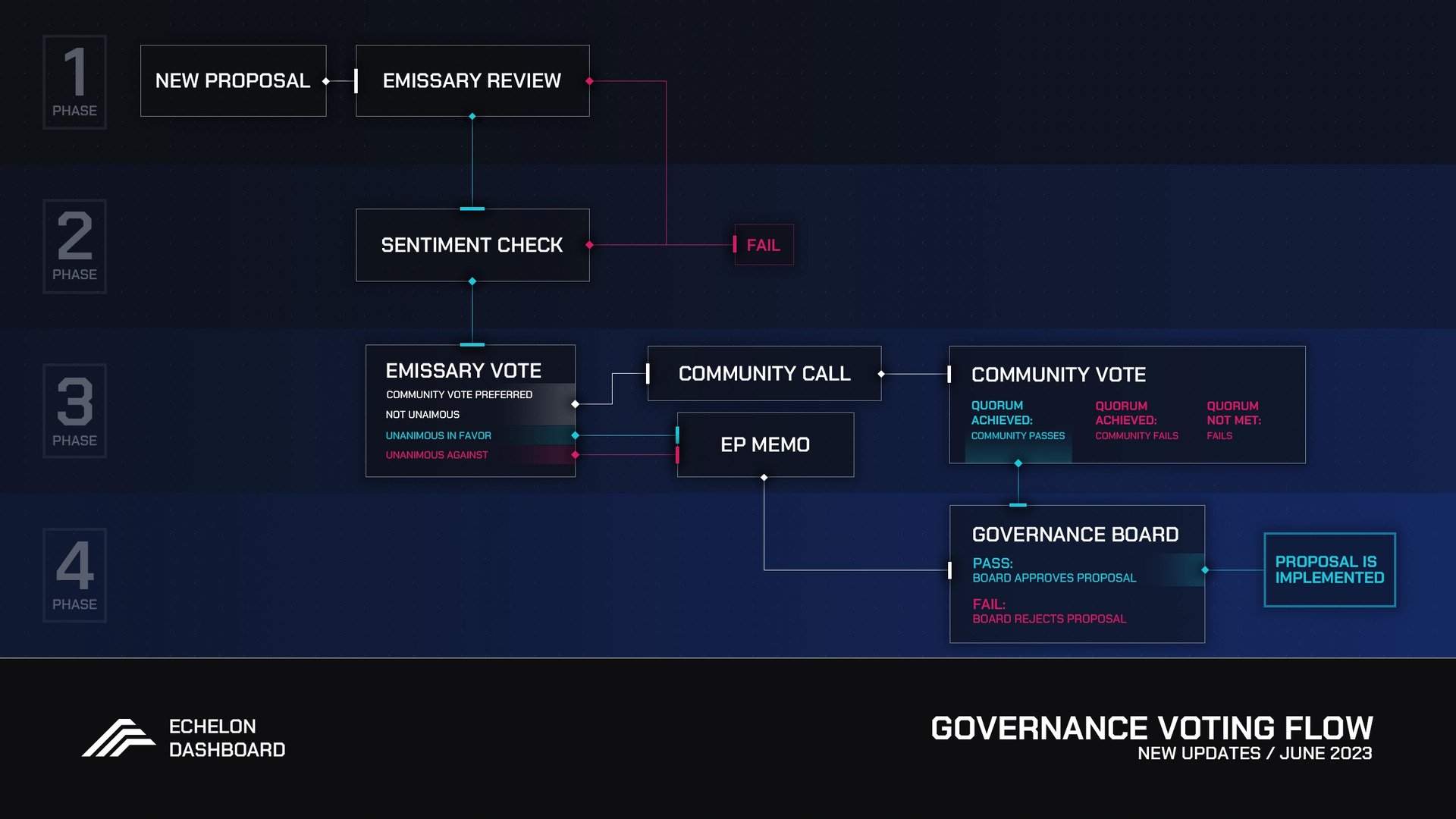Echelon
Echelon (Echelon Prime Foundation이라고도 함)은 이더리움의 web3 생태계 내에서 게임 경제를 구축하고 커뮤니티 중심 구조와 오픈 소스 방법론을 통해 Play-to-Earn (P2E) 경제를 발전시키는 비영리 단체입니다. [1][2]
현재 Parallel TCG 및 Parallel Colony를 개발 중입니다. [2]
개요
Echelon은 게임 개발자를 위한 게임 및 Play-to-Earn(P2E) 생태계를 구축하고 육성하는 데 전념하는 비영리 단체입니다. Echelon 생태계 내에서 PRIME이라는 ERC-20 토큰과 web3 도구를 활용하여 재단은 커뮤니티 주도 환경 내에서 게임의 분산형 혁신을 지원하는 데 전념하는 생태계 및 도구 세트 역할을 합니다. [5]
Echelon의 분산화는 게임 생태계를 활성화하도록 설계된 PRIME 토큰을 포함한 인프라를 포함합니다. 재단은 PRIME 및 P2E 중심 개발 도구를 생태계에서 사용할 수 있도록 하며, 커뮤니티는 방향을 결정하는 데 중요한 역할을 합니다. 커뮤니티에서 선출된 리더인 Emissary Primes는 거버넌스 플랫폼이 제공되면 결국 재단을 운영하여 PRIME과 Echelon 생태계의 미래를 커뮤니티 또는 선출된 리더의 손에 맡깁니다. [5]
Echelon은 제한된 공급의 PRIME 토큰으로 리소스 할당, 스마트 계약 및 희소한 게임 내 리소스에 대한 NFT 발행 프로토콜을 구성하는 플랫폼을 구축하는 것을 목표로 합니다. PRIME 토큰은 Echelon 생태계의 점진적인 분산화를 촉진하고 P2E 경제에서 기술 기반 배출을 통해 광범위한 커뮤니티 참여를 장려합니다. [5]
생태계
Echelon의 독특한 생태계는 PRIME 토큰 경제를 특징으로 하며, P2E(Play-to-Earn) 메커니즘을 지원하는 혁신적인 게임 및 수집 환경을 위한 기반을 마련하도록 설계되었습니다. Echelon 내의 기술 구조, 토큰 경제 및 거버넌스 모듈은 세 가지 주요 이해 관계자 그룹에 가치를 제공합니다. [5]
- 생태계 관리자: PRIME 보유자는 커뮤니티 재무 할당을 결정하고, 시스템 스마트 계약을 감사하며, 재단 구성원을 선출하는 역할을 합니다. Echelon Prime Foundation은 후보 자격을 위해 PRIME을 스테이킹하고 책임감 있는 행동을 장려하기 위해 삭감 가능한 담보로 PRIME을 스테이킹하는 선출된 구성원으로 구성된 이사회에서 관리하며, Echelon Prime Foundation에 대한 전반적인 감독을 수행합니다. 그들의 책임에는 커뮤니티 기반 프로세스를 통해 이루어진 결정의 실행 및 완료를 보장하는 것이 포함됩니다. [5]
- 플레이어 및 수집가: 초기 PRIME 토큰 공급량의 약 30%는 싱크 재분배를 통해 추가 배포될 가능성이 있으며, 스킬 배출량을 기반으로 하는 P2E(Play-to-Earn) 모델을 통해 얻을 수 있습니다. 이 풀은 PRIME 토큰과 Echelon 스마트 계약 생태계를 활용하는 P2E 게임 이니셔티브를 지원합니다. PRIME 보유자는 거버넌스 권한, NFT 판매에 대한 우선 액세스 및 추가 특전과 같은 생태계 내에서 다양한 혜택을 누릴 수 있습니다. [5]
- 콘텐츠 제작자: Echelon 생태계 내에서 개발하는 엔터티는 Echelon의 스마트 계약 및 전체 생태계를 활용할 수 있습니다. 응집력 있는 환경을 조성하고 개발 비용을 완화하기 위해 이 생태계 내의 프로젝트는 자산 및 지적 재산(IP)을 상호 운용 가능하게 하고 서로에게 접근 가능하게 하는 것이 좋습니다. 이 접근 방식은 협업과 공유 리소스가 상호 이익에 기여하는 통합된 생태계를 지원합니다. [5]
Parallel TCG
Parallel TCG는 과학 소설 테마의 트레이딩 카드 게임입니다. 2023년 7월에 베타 액세스가 시작되었습니다. 플레이어는 지정된 제품 및 PRIME 싱크로 알려진 경험을 통해 Parallel에서 PRIME을 활용하고 게임 플레이를 통해 Parallel 내에서 토큰을 얻을 수 있습니다. [3]
Parallel Colony
Parallel Colony는 플레이어가 AI 아바타와 협력하여 광산 콜로니를 관리하는 시뮬레이션 게임입니다. 각 아바타는 6551 지갑을 제어하며, 이는 ERC 1155 및 PRIME 토큰을 포함한 디지털 자산의 소유권을 나타냅니다. [4]
기술
Echelon 생태계 내의 게임은 Echelon Prime Foundation이 제공하는 다양한 기술에 접근할 수 있습니다. 이러한 기술은 Echelon의 소프트웨어 도구 및 SDK(소프트웨어 개발 키트)를 활용하여 Echelon 생태계 구성원이 사용할 수 있습니다. [5]
Inb0x
Inb0x는 web3 애플리케이션을 위해 만들어진 메시징 도구입니다. 종단 간 암호화를 사용하여 Ethereum 주소 간의 안전한 통신을 가능하게 합니다. 사용자는 MetaMask 지갑을 사용하여 inb0x에 연결하고 (향후 추가 지갑 옵션 예상) 특정 wallet 소유자와 대화하고, NFTs에 대한 제안을 하고, ENS를 사용하여 연결된 ENS 주소를 통해 지갑에 연락할 수 있습니다. [5]
PR[SYS]
팩 예약 시스템인 PR[SYS]는 독점적인 NFT 배포 메커니즘입니다. 이 시스템을 통해 NFT를 발행하는 프로젝트는 이더리움 네트워크에 미치는 영향을 최소화하면서 주문을 차별적으로 관리할 수 있습니다. PR[SYS]는 "가스 전쟁"과 봇 구매를 줄여 사용자 경험을 향상시키는 것을 목표로 합니다. 프로덕션 환경에서 이는 자산 예약과 분리된 보다 효율적인 온체인 전송 프로세스를 통해 예약 후 24시간 이내에 완료됩니다. 이 프로세스는 가스 비용을 크게 낮추고 가스 급등 시 예약한 사람들의 확실성을 높입니다. PR[SYS] 워크플로는 예약, 결제, 공개 및 배포를 포함합니다. [6]
- 예약: 사용자는 웹 페이지를 통해 제한된 수의 NFT를 예약합니다. 요청된 NFT를 사용할 수 없는 경우 PR[SYS]는 사용자를 예약 페이지로 안내합니다.
- 결제: 예약 후 사용자는 결제 대기열에 들어갑니다. 차례가 되면 결제 트랜잭션을 제출할 수 있습니다.
- 공개: 결제가 성공하면 사용자는 구매한 NFT를 볼 수 있습니다.
- 배포: PR[SYS]는 네트워크 영향을 최소화하면서 NFT 배포를 사용자의 이더리움 지갑으로 자동화합니다. 향후 드롭에서 구매자는 편의에 따라 NFT를 청구할 수 있으며 가스 비용이 발생합니다. PR[SYS]는 Chainlink 협업을 통해 온체인 무작위화를 통합하여 카드 팩의 무작위 배포를 보장합니다. 다른 프로젝트도 드롭에 PR[SYS]를 사용할 수 있지만 PRIME 수수료가 필요합니다. PR[SYS]는 봇 공격과 바람직하지 않은 결과를 막기 위해 지속적으로 업데이트됩니다.
Faucet
Faucet은 NFT를 배포하는 추가적인 방법으로 사용됩니다. Faucet에 접근할 수 있는 사용자는 가스 수수료를 지불하여 트랜잭션을 시작함으로써 NFT를 획득할 수 있습니다. 활성화되면 Faucet은 미리 정의된 세트에서 하나의 NFT를 무작위로 할당합니다. [5]
게임 오라클
Echelon은 게임 오라클을 사용하여 플레이어의 성과와 NFT를 온체인 원장에서 관찰합니다. 그런 다음 원장은 배출 스마트 계약을 활성화하여 승리에 대한 PRIME을 분배하고 데이터를 게임을 지원하는 API로 구성합니다. 이러한 API는 승리, 패배, 전체 플레이어 및 NFT 기록에 대한 세부 정보를 포함합니다. [6]
동적 재산정 오라클
Echelon과 그 생태계 내 프로젝트들은 PRIME 싱크의 가격을 수정하기 위해 동적 재산정 오라클을 사용하여 게임 보상 공급과 싱크 보충 간의 균형을 보장합니다. 기본적으로 PRIME 싱크의 가격은 캐싱 및 게임 보상 풀의 보충 필요를 충족시키기 위해 동적으로 조정됩니다. [6]
Echelon Digital Assets
NFT
Echelon에서 승인한 NFT는 Echelon 생태계 내 게임에서 도입한 모든 NFT(Non-Fungible Token)를 포함합니다. 게임이 거버넌스 메커니즘을 통해 커뮤니티 승인을 받으면 해당 게임과 관련된 NFT 자산은 Echelon 승인 상태를 얻습니다. [5]
Primary NFTs
특정 NFT 자산은 Echelon 생태계를 시작하기 위해 Primary NFT로 식별될 수 있습니다. 이러한 Primary NFT는 스테이킹을 포함하여 Echelon 생태계의 다양한 구성 요소 내에서 추가적인 이점을 받습니다. Primary NFT의 주요 목적은 NFT 보유자에게 PRIME 배포를 시작하는 것입니다. [5]
Cornerstone NFT
Echelon 생태계 내 프로젝트는 특정 자산을 Cornerstone NFT로 지정할 수 있습니다. 이러한 NFT는 Echelon 스테이킹 계약을 활용하여 분산형 메커니즘을 통해 생태계에 기본적인 가치를 제공합니다. [5]
PRIMEsets
PRIMESets는 Echelon 생태계 내 특정 게임 또는 게임 그룹의 개별 NFT로 구성된 컬렉션을 의미합니다. PRIMESets의 변경 또는 추가는 커뮤니티 거버넌스 메커니즘을 통해 이루어질 수 있습니다. 또한, PRIMESets는 지속적인 PRIME 수익을 위해 스테이킹할 수 있는 옵션이 있습니다. 이 스테이킹 풀에는 초기 토큰 배포량의 2%가 할당되어 12-24개월에 걸쳐 방출됩니다. 장기 스테이킹 보상은 PRIME 싱크 재분배를 통해 지속적으로 제공됩니다. 총 풀은 각 PRIMEset을 스테이킹하는 사람들에게 균등하게 분배되어 PRIMEset의 영향력을 스테이킹 모델에 효과적으로 통합합니다. [5]
PRIME 토큰
PRIME은 Echelon과 그 게임 배열의 유틸리티 토큰 역할을 합니다. PRIME은 토큰 게이트 제품, 서비스 및 PRIME 싱크라고 하는 경험을 제공합니다. PRIME의 고정 공급량은 111,111,111.111개이며, 광범위한 분산 및 배포를 보장하기 위해 Echelon에서 승인한 디지털 자산의 모든 소유자가 클레임할 수 있습니다. 초기 배포는 다음과 같습니다. [7]
- 게임 플레이 풀: 30%
- 투자자: 16.24%
- 창립 팀: 15.06%
- 캐싱: 14.1%
- Echelon 재단 적립금: 10.996%
- Prime 이벤트: 9%
- Parallel Studios 적립금: 4.6%
PRIME 토큰은 Echelon의 생태계 내에서 개발된 게임을 위한 Play-to-Earn(P2E) 경제를 촉진합니다. 생태계는 P2E 메커니즘을 통해 토큰 공급량의 상당 부분을 배포하고 생태계를 활용하는 초기 게임 또는 게임에 할당합니다. PRIME은 Echelon 기술에 대한 액세스에 대한 지불 방법으로 사용되고 생태계의 프로젝트에서 생성된 게임 내 오퍼링(싱크)에 사용되는 등 Echelon 생태계 내에서 다양한 유틸리티를 보유합니다. PRIME 토큰 보유자는 거버넌스 변경을 제안하거나 투표하여 Echelon 생태계를 관리할 수도 있습니다. [5]
PRIME 보상
플레이어는 Echelon 생태계 내에서 게임에 참여하고 성공함으로써 PRIME을 획득합니다. 게임 결과와 다양한 요인들이 플레이어에게 PRIME 토큰을 생성합니다. 게임 간의 PRIME 할당은 각 Echelon 승인 게임의 인기와 성과를 반영합니다. Echelon의 미션에 부합하는 다른 애플리케이션 및 도구도 혁신적인 PRIME 싱크를 도입하여 보상 풀 분배에 접근할 수 있습니다. [6]
PRIME 싱크
PRIME 싱크는 Echelon 생태계 내 게임 또는 프로젝트에 내장된 구성 요소로, PRIME 토큰으로 지불해야 합니다. 이러한 싱크는 사용자 참여를 위한 기능 개발을 지원하고 게임 보상 풀을 보충하는 역할을 합니다. 싱크의 가격은 오라클 입력에 따라 PRIME으로 변동될 수 있습니다. 싱크에서 사용된 PRIME은 유통 상태를 유지하며, 게임 보상 풀 계약, 캐싱 계약 및 기타 기능으로 재분배되어 확장성 동안 경제적 균형을 유지하는 데 도움이 됩니다. 프로젝트 내에서 PRIME 싱크를 도입하려면 게임 보상 풀에 액세스하기 전에 Echelon 커뮤니티 거버넌스 투표를 통해 승인을 받아야 합니다. [6]
라이브 싱크
- 아티그래프 - 아티그래프는 디지털 서명이 된 Parallel 카드를 의미합니다. Parallel TCG에서 게임 필드에 도입될 때 아티그래프는 서명을 표시합니다. 각 카드에는 서명된 버전의 수가 제한되어 있습니다.
- 페이로드 - PRIME을 활용하여 일반 카드부터 희귀 자산에 이르기까지 무작위 Parallel 카드를 획득합니다.
- 에코 - PRIME을 사용하여 FE, SE 및 PL 카드에서 복제된 NFT인 '에코'를 생성합니다. Parallel 플레이에 필수는 아니지만, 에코는 증가하는 플레이어 수를 수용하기 위해 제한된 NFT를 확장하는 데 중요합니다. NFT는 Parallel 참여에 필수는 아니지만 게임 플레이를 통해 PRIME을 얻는 데 필수적입니다.
- 터미널 - 터미널은 각 Parallel의 시스템과 전초 기지 간의 통신 수단 역할을 합니다. 이 프로세스에는 PRIME을 사용하여 샤드 조각을 배터리로 정제한 다음 터미널을 활성화하는 것이 포함됩니다. 이 활성화를 통해 고유한 게임 내 보상이 공개됩니다.
- 아바타 - 아바타는 Parallel이라고 하는 5개 진영의 독특한 캐릭터를 나타냅니다. 이 완전한 3D 모델은 지속적으로 확장되는 Parallel 세계와의 참여를 향상시킵니다. 하나를 프로필 사진으로 지정하고, TCG 승리로 추가 PRIME을 얻고, 향후 경험에 대한 우선 액세스 권한을 얻을 수 있습니다.
- 글린트 - 글린트는 Parallel TCG에서 NFT가 아닌 거래에 사용되는 통화 역할을 합니다. PRIME 또는 법정 화폐를 사용하여 얻을 수 있습니다.
- 코스메틱 - Parallel TCG의 코스메틱에는 스킨, 이모티콘 및 기타 디지털 수집품이 포함되어 있어 게임 경험을 향상시키도록 설계되었습니다. 이러한 아이템은 PRIME으로만 구매할 수 있으며 공급량이 제한되어 있으며 공급량이 제한되면 추가 민팅이 없습니다. [8]
미래 소모처
- 카드 대여 - 플레이어는 덱 구성을 위해 NFT 카드를 빌리는 데 PRIME을 지불합니다. 컬렉터는 NFT 카드를 풀에 예치하고 수수료의 일부를 얻습니다.
- 본드 - 본드는 집단 플레이어 경제 시스템으로 작동하여 멤버는 차용 수수료 없이 본드 내에서 NFT 카드를 빌릴 수 있습니다. 차용 카드 비용은 게임 플레이 배출량에 대한 레이크를 통해 충당되며, 관리자는 레이크 비율을 설정하고 조정할 수 있습니다. 멤버십은 독점적이며, 개인은 한 번에 하나의 본드에만 참여할 수 있습니다. 숙련된 플레이어는 잠재적으로 낮은 레이크로 본드에 가입할 수 있으며, 번성한 차용인은 대출 기관이 각 승리에 대해 더 작은 비율을 가져갈 수 있습니다. 본드 시스템은 초기 생성 수수료, 지속적인 유지 관리 수수료 및 레이크의 일부를 통해 PRIME을 소모합니다.
- 장비 - 플레이어와 컬렉터는 PRIME을 사용하여 Parallel 카드에서 완전한 3D 장비를 추출할 수 있습니다.
- 실물 카드 - PRIME 토큰 보유자는 실제 Parallel 트레이딩 카드를 구매할 수 있습니다. [9]
거버넌스
PRIME 토큰을 보유한 사용자는 거버넌스 제안 및 특사 프라임 선거를 통해 거버넌스에 참여할 수 있습니다.
- 거버넌스 제안은 Echelon 생태계 내에서 변경 사항을 구현하는 수단으로 사용됩니다. 거버넌스 제안서를 제출하려면 2 PRIME의 수수료가 필요합니다. 거버넌스 제안 처리 절차는 제공된 순서도에 설명된 단계를 따릅니다. [3]
- 특사 프라임(EP)은 커뮤니티에서 PRIME 보유자 및 Echelon 생태계를 대표하도록 선출된 개인입니다. 이들은 커뮤니티와 협력하여 생태계를 개선하고 Echelon의 사명을 지원합니다. [3]
Echelon 거버넌스 기구인 Echelon Council은 플레이어 대표, 게임 개발 스튜디오, 기술 전문 지식, 보안 전문 지식, 경제 전문 지식 및 법률 전문 지식과 같이 서로 다른 범주의 11명의 구성원으로 구성되어야 합니다. 이러한 각 범주에는 최소 한 명의 커뮤니티 구성원이 포함되어야 합니다. [5]

